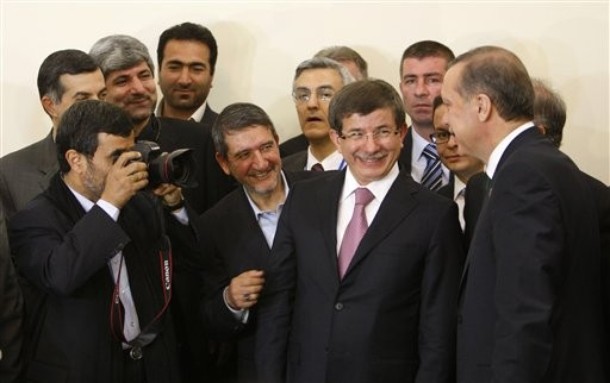
Don’t look now, but a surge of pro-active diplomacy by Brazil and Turkey toward Iran may offer a glimpse of evolving new patterns in international affairs. This is the world of the G-20, where rising middle powers (and larger ones like China and India) will decide whether the period ahead is one more of New World Order than Disorder.
It might seem to be a conceit of a rising player that after endless rounds of major power diplomacy toward Iran that came up empty, Brazil’s President Lula da Silva could succeed. Turkey’s Prime Minister Reccip Erdogan held out until his foreign minister got Iran to agree before he showed up in Tehran.
After 18 hours of meetings between Brazilian, Turkish and Iranian foreign ministers, it was announced late Sunday that Iran had agreed to send its uranium to Turkey for enrichment. Unfortunately, unlike the previous Western offered swap deal under which Iran would have turned over some 80% of its low-enriched uranium for higher enriched uranium for use in medical isotopes, under the Brazil-Turkey brokered deal they would turn over only 50% of it — leaving them with a bomb’s worth. And Iranian officials have said they will continue to enrich to 20%, which if carried out, would undermine the deal altogether.
Whether the deal holds and opens the door to a solution the IAEA deems consistent with Iranian obligations or in the end is yet another Iranian stalling, this new emerging power diplomacy by two of what might be called “pivotal states,” Brazil and Turkey, is a phenomenon that may become more familiar in the period ahead. When President Obama elevated the G-20 to the premier forum on international finance and economy last September in Pittsburgh, it reflected an important recognition that the world has changed. As we have seen since the onset of the Great Recession, it is emerging economies — China, India, Brazil, Indonesia and other — now acting as the engine of global growth.
Fast Forwarding History
Not surprisingly, Brazil and Turkey are not the only emerging middle powers that fancy themselves larger global players. Others like Indonesia and perhaps South Korea, which hosts the next G20 meeting in September, also tend to see their new G20 status as an encouragement to play a larger role on the world stage.
This broad trend of emerging powers stepping into the breach of global diplomacy seems in no small measure a consequence of the financial crisis and Great Recession, which appears to have accelerated historical trends. As the Euro crisis continues to unfold, what we see thus far is a sort of bifurcated recovery, with the G-7 countries, particularly those in Europe, muddling along at barely one percent growth, while the developing G-20 nations, let by China and India, are booming.
While the US has three quarters of positive growth in three percent range, continued unemployment at nearly ten percent and record budget deficits over $1 trillion take much of the luster from the still fragile recovery.
Certainly US-led diplomacy, whether it is Middle East Peace or efforts to roll back North Korean or Iranian nuclear proliferation threats, has faced a rough patch. And if you are Brazil or Turkey, it is a low-risk, high-payoff proposition. After all, if the world’s major powers couldn’t reach a deal with Iran, why not give it a shot? For Turkey, which has an omnidirectional foreign policy reflecting its geography (surrounded by Europe, the Middle East and Central Asia), this new diplomatic bridging role is becoming familiar. Ankara had previously played a mediating role between Syria and Turkey in talks aimed at ginning up an agreement on the Golan Heights.
A Whole New World?
Looking ahead, the larger question raised by this emerging power assertiveness is whether it is the harbinger of new stakeholders prepared to share the burden of providing public goods or simply a la carte recreational diplomacy as it suits their fancy. In a sense that is also one of the big questions about the role of the newly anointed G-20. As emerging powers are given a seat at the Big Table, what will they do with their enhanced status? Will the often mentioned diffusion of power lead to a “non-polar” world, where there is a global leadership deficit? Or will we increasingly see a pooling of power, where new actors step up and demonstrate that they are ready for prime time?
The outcome of the Brazil-Turkey pro-active nuclear diplomacy remains uncertain. It has created some breathing space for all concerned parties. The Perm Five agreement to impose sanctions on Iran, however modest, underscores the continued ambiguity of the situation. The next test of these emerging powers may be how they respond if rather than opening the door to renewed diplomatic efforts, Iran finds ways to walk away from its commitment. Will they then join efforts to step up pressure on Iran?
Conversely, if this middle power diplomacy proves successful in reining in Iran will such success be a stepping stone to still more global problem solving?
Robert Manning is a Senior Advisor to the Atlantic Council. The views expressed here are solely his own, not those of any U.S. government agency. Photo: AP Photo.
Image: 610x_7.jpg
